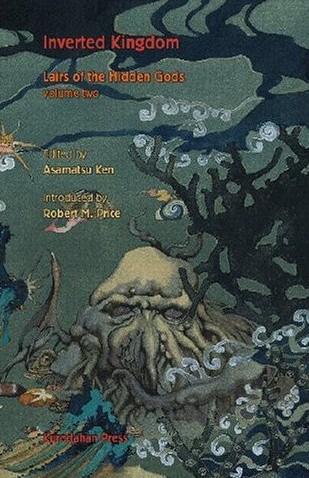 Edited By ASAMATSU KEN (Kurodahan Press; 2005)
Edited By ASAMATSU KEN (Kurodahan Press; 2005)
This is the second of Kurodahan Press’ four volume LAIRS OF THE HIDDEN GODS anthology of Japanese Cthulhu Mythos, and, as with the first entry, it’s a first rate collection with excellent translations. The overall fascination is in experiencing the H.P. Lovecraft created mythos through Japanese sensibilities, which, as editor Asamatsu Ken makes clear in his forward to the book and assorted brief introductions to the stories, are harmonious in some respects yet quite distinct in many others.
Asamatsu’s highly learned introductions are a large part of what makes these books so distinct. His knowledge of all things Cthulhu-related is impressive, and bolstered by unerringly pertinent observations. Example: “I am inclined to think that the greatest compliment one may pay a horror writer is not to ask politely, “Where do you get your ideas?,” but rather to say, “That guy is one sick bastard!”
The novella-length “Horror in the Kabuki Theater” by Ashibe Taku begins the collection. It’s notable for a voluminously researched depiction of an early 19th Century Kabuki theater threatened by an evil entity unwittingly summoned by the plays performed in that theater. Much authentic historical detail is utilized in the story, with the reality-inspired drama of the theater’s long-suffering playwrights registering just as strongly as the supernatural outrages.
Matsudono Rio’s “Taste of Snake’s Honey,” another lengthy piece, wreaks some perverse twists on the Mythos. It’s about an American man visiting a 1930s-era Shanghai brothel to have sex with a corpse, and in the process discovering many disquieting facts about his own existence. Necrophilia, I should add, isn’t the only taboo violated in this gripping tale, which also includes incest and (possibly) bestiality.
As for the title story by Matsuo Mirae, it features a woman narrator becoming aware of her true identity as a cthuloid critter. “Terror Rate” by Konaka Chiaki is a deliciously old fashioned account of a young woman paid to stay in the apparently haunted house of a professor so he can measure how frightened she gets. “Summoned By the Shadows” by Hirayama Yumeaki has a similarly old school vibe, being the tale of a taxi driver and a race of fish-people horrifically intruding on his family’s reality.
Tanaka Fumio’s “Secrets of the Abyss” centers on a mysterious fish with apparent healing powers, and what happens when a man attempts to catch it. “A Night at Yuan-Su” by Nanjo Takenori is a short tale that pays explicit homage to Lovecraft’s stories “He” and “The Outsider,” and is taken up largely with a minute description of the author’s own hometown.
The book concludes with “Cthulhu Mythos in Gaming,” a nonfiction piece by Yasuda Hitoshi. I’ll confess I have little interest in role playing games, although I did get a kick out of the description of the 1981 game CALL OF CTHULHU, in which players are given a steadily decreasing “sanity rating.” Asamatsu Ken is also clearly amused by this aspect, as he makes reference to it in his introduction to Yasuda’s piece, admitting he may well have lost most of his own sanity points in the writing game—but, he smartly adds, “if I have retained any, it is because I have not made the cardinal error of pathological geeks: I have made sure my life is about a lot more than this.”
